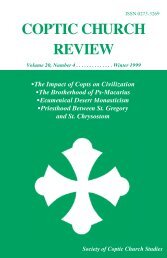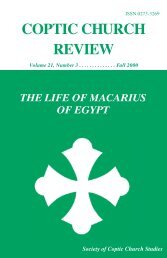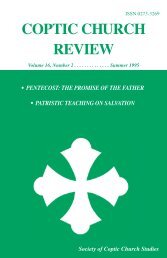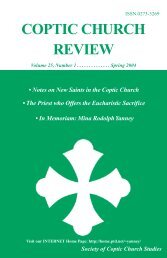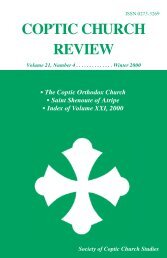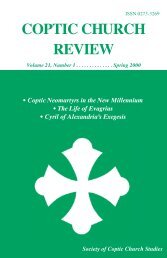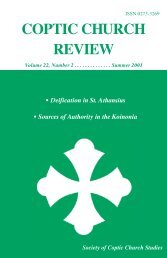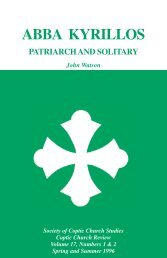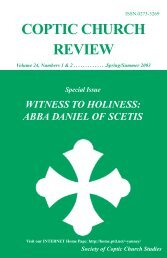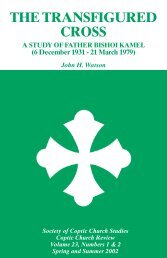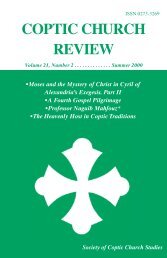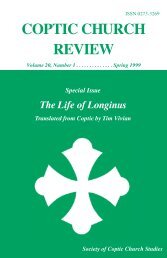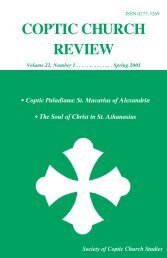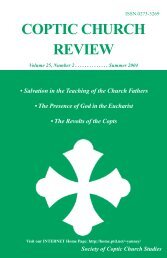2004 Fall.Vol25.#3.pdf - Coptic Church Review
2004 Fall.Vol25.#3.pdf - Coptic Church Review
2004 Fall.Vol25.#3.pdf - Coptic Church Review
You also want an ePaper? Increase the reach of your titles
YUMPU automatically turns print PDFs into web optimized ePapers that Google loves.
80 <strong>Fall</strong> <strong>2004</strong> • <strong>Coptic</strong> <strong>Church</strong> <strong>Review</strong> - Volume 25, Number 3<br />
ly so, how do you think that there is less guilt to have neglected<br />
God’s word than to have neglected his body? 13<br />
Besides giving witness to the belief in the real presence of our Lord in the<br />
Sacrament, this text contains valuable information concerning its rites and the regular<br />
participation of the people in it. Origen also has the same teaching in his<br />
Homilies on Numbers (Hom. 7, 2): “Formerly, in an obscure way, there was manna<br />
for food; now, however, in full view, there is the true food, the Flesh of the Word of<br />
God, as He himself says: ‘My Flesh is truly food, and my Blood is truly drink’ (Jn<br />
6: 6).” 14<br />
Belief in the Real Presence of Christ in the Eucharist<br />
in the Fourth and Fifth Centuries<br />
The fourth and fifth centuries are known as the Golden Age of<br />
Patristic Literature. The great Fathers and Doctors of the<br />
<strong>Church</strong> in this period, many of whom were archbishops or<br />
bishops of the main cities, have left for us numerous studies on<br />
the Eucharist in their homilies, as well as texts of the liturgies<br />
used in that age. Their biblical commentaries did not leave a<br />
single text related to the Eucharist, whether in the Old or New<br />
Testaments. Thanks to the patristic revival in the second half of<br />
the twentieth century, all these texts have modern translations<br />
that are available not only in studies of the Fathers themselves,<br />
but also in biblical commentaries, and in liturgical, spiritual<br />
and dogmatic studies. Only a small sample of these writing can<br />
be mentioned here. I hope the references may be of help for<br />
those interested in spending their life reading about the<br />
Eucharist. The few examples given here will illustrate how the<br />
Fathers did not differentiate between doctrine and spiritual life.<br />
There were no dogmatic arguments about the Eucharist, the<br />
belief was one in both East and West; it was the same whether<br />
the author wrote in Greek, Latin or Syriac. The faith in the<br />
presence of Christ in the Eucharist was not for arguments and<br />
rhetoric but entered into the daily spiritual life of every<br />
Christian believer.<br />
13 Origen, Homilies on Genesis and Exodus. Translated by Ronald Heine (‘Fathers of the <strong>Church</strong><br />
series, # 71. CUA Press, 1981: 380- 81(Homily 13: 3, on Exodus 35). This homily was preached<br />
in 244 at Caesarea in Palestine.<br />
14 Translation in Jrrgens WA: The Faith of our Fathers. Liturgical Press, Collegeville< MN, vol.1,<br />
1976: 206.




